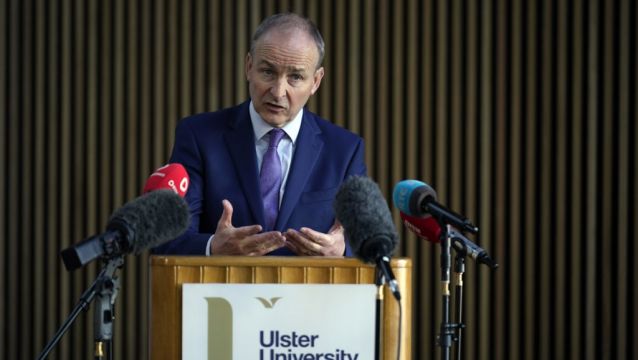Tánaiste Micheál Martin has called for a debate on reforming Northern Ireland’s powersharing institutions.
The Minister for Foreign Affairs said young adults have had “very little opportunity” to see politics deliver for them and the public has “zero tolerance for another cycle of suspension, disenfranchisement and political torpor”.
The DUP exercised its veto under powersharing at Stormont to blockade the institutions for two years in protest at post-Brexit trading arrangements.
The party ended its boycott last month, allowing for devolution to return.
Speaking at the Alliance Party conference in Belfast, Mr Martin said he had been “doing a lot of thinking” about how Northern Ireland’s political institutions could become more stable.
Though he had refrained from discussing such reforms during the years when powersharing had collapsed, he said it is now time to discuss improvements
“With it in place, I feel that the opportunity to begin a meaningful conversation about reform presents itself,” the Tánaiste told the conference.
“We have had two extended periods of years of one party and then another blocking the formation of the Executive. We just cannot have another such period.
“I don’t think any party wants that and I am certain that the public would have zero tolerance for another cycle of suspension, disenfranchisement and political torpor.
“And therefore I have said it makes sense for us to look now at what we can do to make the institutions more stable and effective while, of course, retaining the agreement’s foundational commitment to meaningful powersharing and inclusiveness.”
He said Northern Ireland is “undeniably a better place” since the Good Friday Agreement, and any reform discussions will need to involve “all the parties, civic voices and both governments”.
“We cannot have any more one-sided negotiations only involving one party or one perspective. This is a plural place and its plurality must be respected.
“Of course change, evolution, in the current arrangements is delicate. Any discussion will raise complex and sensitive issues.
“If such discussions are framed as excluding or ‘getting around’ one party or one tradition, they will rightly fail.
“We cannot be reckless with the delicate balances and protections at the heart of the agreement.”
He said there are “serious questions” over the power a single party has to block the functioning of the Assembly, over whether the roles of first minister and deputy first minister should be replaced with joint first ministers, and whether the Petition of Concern can be returned to its “original intent” of protecting minority rights.
He said any discussion of reform of powersharing would need to be a “serious, collective undertaking”, but also warned that caution cannot lead to “inertia”.
“Unfortunately, there is a tendency among some to assume that the Executive ‘can’t work, won’t work’.
“This attitude is informed, in part, by scepticism but, sadly, it is informed also by experience.
“This is a dangerous idea to allow to fester. The default assumption cannot be that the institutions are unlikely to work – the default assumption must be that they will last.
“As I have said, I believe it is time for that conversation to start.”







